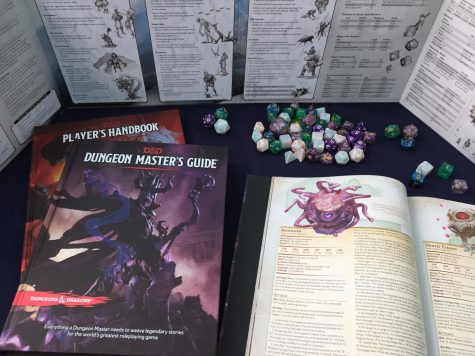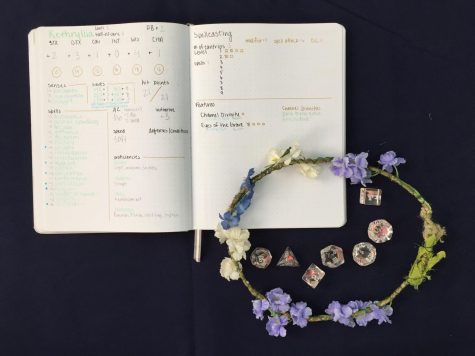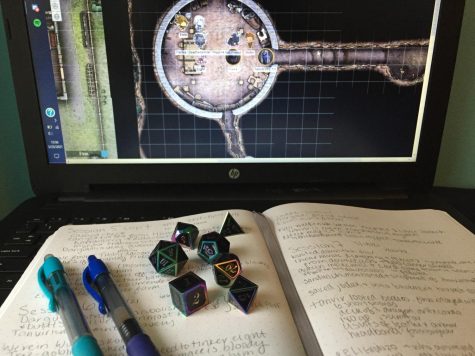
Players use the d20 dice the most often. It determines attack rolls, skill checks, and saving throws.
Power of the nerd: Dungeons & Dragons
The rogue creeps around the corner, keeping an eye out for traps. The ranger has an arrow notched. The wizard is ready with a Fireball. The cleric is prepared for a Healing Word if anything goes wrong. They turn the corner, but from behind them rolls in a beholder, prepared with its Paralyzing Ray. Roll Initiative.
“You’ve got your perfect warlock,” but where did it all begin? Dungeons & Dragons, a popular tabletop role-playing game (TTRPG), made its rise into the scene in recent years. Thanks to the popularity of shows like “Critical Role” and “The Adventure Zone,” the once-taboo game rises from the dust.
Dungeons & Dragons has everything a person could need. It is social, it is escapism, it is stress-relieving, and it is fantastic. The table can be a magical place for players to explore the world and their characters. As COVID-19 hit, gameplay changed, but the game found even more of a role in the lives of players.
TTRPGs are just one piece in the world of nerds. In honor of the Chicago Comic & Entertainment Expo, here is what Dungeons & Dragons means to Metea students and teachers. The convention would have taken place March 26-28, but it is now scheduled for Dec. 10-12.
What is D&D?
Wizards of the Coast owns the rights to Dungeons & Dragons (D&D) and Magic: The Gathering. Both of these games are high fantasy games. D&D focuses on role-playing, and Magic focuses on strategy. The beloved version of D&D that we know today started in 1974. Created by Gary Gygax, it is now known as Dungeons & Dragons 1st Edition. After many edits, playtests, and new variations, D&D 5th Edition (D&D 5e) is the most common among players today. Beyond Wizards of the Coast, players also enjoy the systems of Pathfinder and Cyberpunk 2020.
D&D is a TTRPG, which means that players typically gather around a table and take on the role of a character. They work together to complete quests and go on adventures. In D&D, there are 12 core classes, ranging from raging barbarians to healing clerics to musical bards. They can dwell through dungeons, fight dragons, and do anything in between. Every world is different. There are published settings from Wizard of the Coast like Faerun, the Forgotten Realms, and Keith Baker’s Eberron. Some game masters play in homebrew worlds that they create themselves. There’s magic, powerful deities, fey, elementals, and so much more. It all comes down to your imagination.
See a game from the interviewees here:
Fantasy life lessons
At its core, D&D is a combat simulator, but for most, it’s more than that.
“It’s a sandbox world,” senior Robyn Haddad said. “You can fight dragons, you can build a house, you can just do whatever. It’s this own world that you’re in with you and your friends that you can create and have fun and battle and do whatever. It’s so much fun.”
The tone of every campaign can differ. Some are very calm and objective-focused, while other game masters have hard-hitting plots and character development. Senior Ciara Kenny plays in a game that senior Jaaggruth Kondakalla runs, and they have a mixture of fun moments and deep development.
“We get into such ridiculous situations and we love to make fun of each other’s characters,” Kenny said. “It’s all lighthearted, but I enjoy bantering off with my friends about the ridiculousness of what the game is going through.”
There are normally two parts of D&D: combat and role-playing. Both are vital to make the game what it is, but each campaign creates a unique balance. For Kondakalla’s game, he incorporates a lot more role-play, and it is his favorite part of the game.

“I love it when they role-play with each other,” Kondakalla said. “Once they start, I can just step back and let them role-play with each other, maybe add an NPC [non-player character] or two to spice it up. That’s super rewarding for me.”
As a player, senior Jake Zeitner also loves role-playing. Since he got into D&D through an acting-adjacent activity, he naturally led into that side of the game.
“I like acting everything out,” Zeitner said. “I especially liked it with the group that I played with just because everyone did theatre and we were just having a good old time. That was very fun, but also the battling was super cool, even though I wasn’t super good at it.”
In extensive homebrewed worlds, players can explore and learn all about the lore. For German student teacher Beth Savage, exploration is a huge part of the game.
“It hits all of my interests,” Savage said. “It’s reading and lore, all of this past background information. You can take all of that and write and build yourself your own character. That to me, I love it.”
D&D also teaches you about yourself. Through the vessel of a character, players can explore interests, identities, and social strategies. Senior Ciara Kenny found a common pattern with most players.
“I found that it’s always easier to try to be yourself in these games,” Kenny said. “I know it’s kind of escapism, but you never really escape what you really are. Everyone ends up playing what they already think in real life, just with a fantasy twist.”
As Kenny said, D&D is escapism. It gives players a break from reality for four or so hours. Senior Ri Pritchard enjoys being pulled away into a world of his creation.
“D&D allows me to focus on something other than the world around me, so I shift from the world around me into this fantasy world where I can make something whatever I need it to be or have things be a certain way,” Pritchard said. “It creates, not ideal per se, but a world of my own creation in which, if I don’t like something, I can just change it. The interaction of my players and how they shape the world also poses plenty of problem-solving and logical issues that I need to sort out, which is a good way to hold my attention.”
Even though D&D is fantasy, there are so many lessons to pull from the game. Being in a world where there are no real consequences lets you get into tough dilemmas and work your way out, learning along the way.

“Life can be really frustrating, and D&D can be really frustrating, and you have to take your time and know that where you end up, everything will be okay,” Haddad said. “I’ve had situations where you’re in a dungeon, and your whole party is down except for you, and it seems hopeless, but then something happens, or you realize something that you didn’t realize before. You think outside the box and everything works out in the end.”
Some of the lessons from D&D are logistical, like problem solving and perseverance. Other lessons can be social, thanks to the infinite social opportunities with party members and NPCs. On the social side, party dynamics taught Kenny the importance of speaking up confidently.
“If you want things to get done, you can’t take a passive role,” Kenny said. “Even in real life, if you just take what other people are giving you, that’s not your story anymore. Even with people you care about, all my friends in these campaigns, they value my opinion and what I think, so I need to make my voice heard if I want to do things in a way that I find enjoyable.”
Pritchard emphasizes the value of teamwork. Occasionally, players run into toxic stereotypes, one of which being the player who thinks they can “win” D&D. The game is a team effort, and Pritchard tries to enforce collaboration in his campaigns.
“One of the worst things that a player can do is think they are the main character, or they’ve gotten it into their head this notion of winning,” Pritchard said. “Having someone who wants to be the main character of the story deducts from everyone else’s enjoyment of D&D. D&D is collaborative storytelling at its heart.”
Collaborative storytelling. Whether it be the characters working together in-game, or the players working together to schedule and create backstories, the heart of D&D is the collaboration with those at the table.
The social aspect
The best part of D&D for most players is the social aspect. Sessions normally run for about two to four hours, but some can be ridiculously long. To come back to the table every week, there needs to be a reason. For almost every player, it is their friends.
“I love hanging out with my friends,” Kondakalla said. “We don’t do it often enough, but once a week for three hours, we can just chill and have a good time.”
Additionally, D&D is a scheduled activity. For Zeitner, Haddad, and Kenny, who are all busy people, D&D allows them to commit time where they can hang out with their friends.
“I’m in general a very busy person, so unless I have a stated reason for hanging out with someone, I generally don’t,” Kenny said. “So this is a good way of tricking myself into hanging out with the people who care about me. These aren’t people that I see on a daily basis anymore, so I find it easier to talk to my friends this way when I have a stated purpose to hang out.”
Beyond that, weekly games give players a break from their stress.
“It’s like a sectioned off time from my day when I can just take a break from the stress of everything that’s happening in the world and the stress of school, and I can just have a good time with people who have similar interests as me,” Zeitner said.
Haddad loves the action and involvement of her campaign in addition to the social aspect.
“I can forget about my day for a little bit and hang out with my friends,” Haddad said. “It’s almost like watching a really cool movie where you get to choose what happens, like a choose-your-own-adventure, like playing any other video game, but it’s with my friends and a lot more fun in that aspect. It’s something to do for four hours while we hang out.”
Now with COVID-19, campaigns have moved to online tabletops and theatre of the mind, meaning no maps or visual aids. Discord and Roll20 are popular sites to get parties together.
For some, quarantine has made scheduling easier for groups to play. The school day ends earlier and there are fewer extracurricular activities, so players have a more open schedule.
“Because it was the pandemic, it was a lot easier, so we met up a lot more often, switching from every other week to once a week, maybe even twice a week,” Haddad said. “Honestly, it was a lot easier for all of us to get together because we could do things.”
In Savage’s party, the online experience has helped them improve their quality of play. They play more often and get better at it every time.

“Before COVID, it seems if we met in person, we had a lot of fun and had food, but now with it online, I almost feel like we are more focused on the mission,” Savage said. “We all have our notes and everything. It’s become a more regular part of my life since COVID has been happening, and I’m really happy for that.”
Savage uses online tabletops to play. She went to school in Alabama previously, so that is where most of her friends are. Now that she is studying at DePaul University, she uses Roll20 to play D&D with her friends online.
“Especially now with quarantine, it’s been a way for big groups of friends to get together,” Savage said. “It has let me continue meeting with my friends back home in Alabama. On weekends, it’s really nice to be able to see everybody. We definitely don’t play the game the whole way through. There are a lot of sidebars and chatting with friends. That’s something I look forward to really every week. It’s a pick-up for me.”
Like Savage’s situation, players have been moving to online tabletops due to COVID-19. Because of that, traditional gameplay stopped. The tabletop experience moved to virtual tables. However, D&D still serves to bring friends together.
“It’s definitely given me something that I look forward to every week, and that if I’m feeling down or don’t have anything else to look forward to, I just remember, ‘oh, I have D&D on Thursday,’” Pritchard said. “It gives me something to look forward to that I can rely upon for social interaction.”
D&D has been helpful for these players to get their stress out and feed on social energy, both in-person and online. It helps them stay in contact with friends near and far. While there is a learning curve for the game, the benefits are endless.
“For someone who wants to play, I’d say go for it,” Zeitner said. “Honestly, the times that I had with my old group were some of the best memories I’ve made with those friends. It really is a good thing to keep you busy while also not putting added stress in your life. It’s straight-up fun.”
This story was originally published on Metea Media on March 26, 2021.

